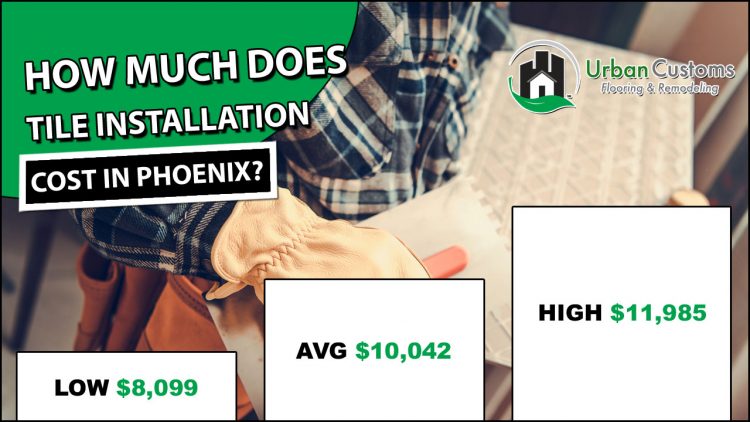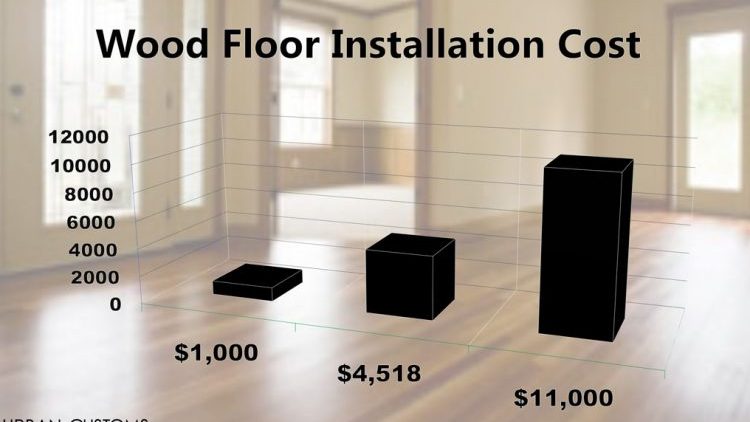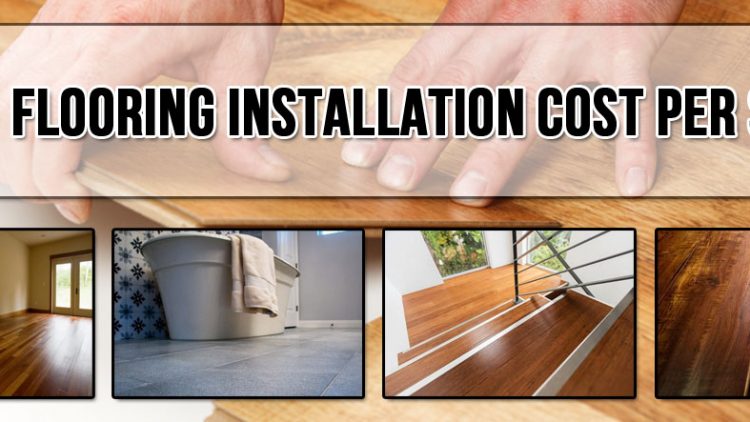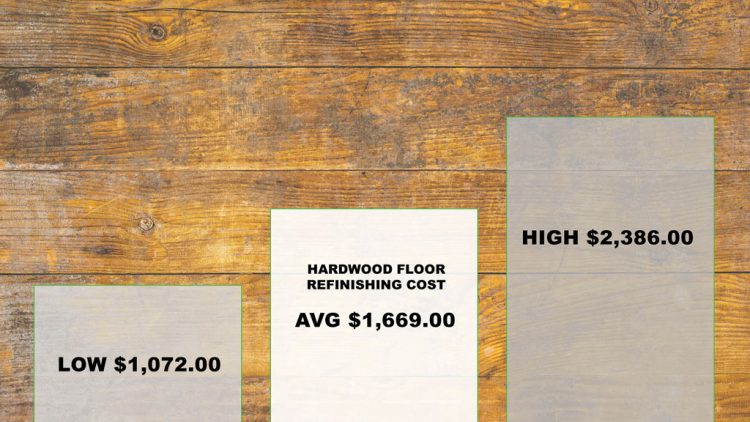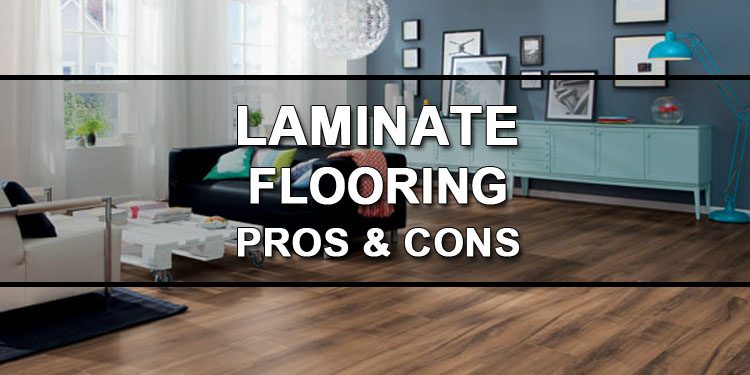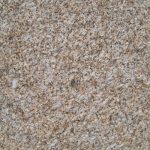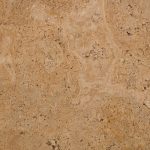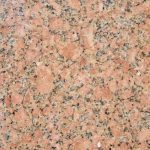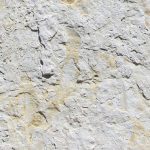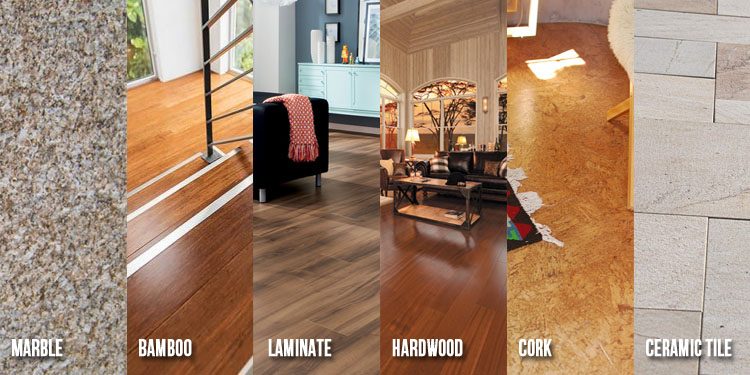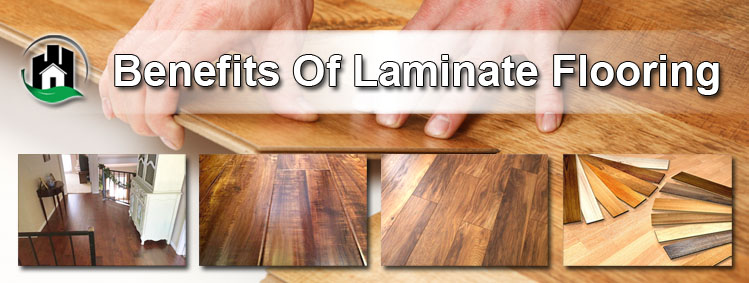If you are wondering how much your flooring installation will cost per sq. ft. of your home or business in 2018, this post should help! Here we all different types of flooring and their cost per sq. ft. to install.
What Can You Expect to Spend on Flooring Installation?
Flooring installation generally costs anywhere between $1,500 to $4,500 but low-end flooring can also be installed for around $200 while high-end flooring can go as high as $10,000. Residents of the US spend around $3,000 on flooring installation on average.
Flooring Options and Costs
As mentioned earlier, homeowners report an average cost of approximately $3,000 to install flooring, with average costs ranging from as low as $200 to be as exorbitant as $10,000 and this is because of the varying flooring materials, types and qualities of flooring options available for installation. Installing durable flooring may come at a considerable financial cost but consider it a long-term investment that will provide protection and character to your home, and might just last as long as the house does itself. What you can expect to spend depends greatly on the type of flooring you’re after and your reason for installing it. Are you after something that you can clean easily? Are you after something that won’t attract particular allergens? Or is it more important that the flooring reflects your character and the character of your home? And that’s not all; deciding on material is only the first step in estimating costs, which will also depend on the quality of the material you intend to use and installation charges. Some floorings are easily installed while others require more expertise and hence, cost more.
Wood Flooring Cost
When it comes to wood flooring, you can either purchase solid wood flooring or engineered wood flooring. Solid wood floors are about 3/4inches in thickness and come in raw and pre-finished states. This is good quality flooring with purchase costs sitting at the higher end of the range.
Engineered wood flooring, on the other hand, costs less as it comprises of a 1/8 inches thick solid wood top layer sitting on several layers of plywood. Maple, cherry and oak woods are all popular choices for top layers. This type of flooring is cost-efficient and can be made to look like solid wood flooring through refinishing. Refinishing, however, scrapes away some layers off the surface each time, reducing their lifespan and making engineered wood floors less durable than solid wood floors.
Cost
Installing wood flooring over an area of 1,000 square feet will put you back about $8,000. Many homeowners go for wood floors in certain rooms rather than the entire house to save on cost. Most popular choices of rooms to put wood flooring in are living/drawing rooms, bedrooms and dining rooms, all of which add up to a combined average area of 550 square feet. Having wood flooring installed in only certain rooms can bring your costs down by half to about $4,400, costing you $8-$10/square-foot.
Factors Affecting Cost
Purchase and installation costs will vary based on a number of factors.
- The type and quality of wood being used
- Travel and transport costs. Transporting goods and manpower will cost more if you live in a remote area.
- Having the floors installed around existing electrical frames, plumbing and HVAC or other systems.
- Old houses might have traces of hazardous materials like lead or asbestos which the house will need to be tested for and the materials abated.
- Supervision of a general contractor will cost you an added 15%-23% of the total cost.
- Sales tax on raw material and purchased items
- You might be required to acquire permits or have inspections carried out by authorities, all of which will cost.
Pros and Cons
Pros
- Wood is timeless and welcoming, with a classic look.
- Matching furniture to wood flooring is easier because of its neutral color.
- Wood flooring is great during cold weather as it retains warmth due to its insulating nature.
- With proper maintenance and care, wood floors can last a very long time. Some wood floors existing today were laid out hundreds of years ago.
- Easy maintenance.
- Easy to sand and refinish multiple times to bring new life to the floor, whereas a carpet may have to be replaced every few years or so.
- Ideal for people with allergies as dust and allergens don’t get trapped in the wood.
Cons
- Easily affected by humidity and moisture. Exposure to water even from small leaks will cause considerable damage if not treated.
- Unsuitable for bathrooms and laundry rooms due to the harmful effect moisture has on wood.
- Wood flooring is susceptible to bending and may pop up if laid out on an uneven substructure. This will need to be checked for and rectified before installation, involving additional costs.
- Certain wood finishes scratch easily, however, as a rule of thumb, finishes that get scratched easily can be easily repaired as well. Finishes like polyurethane that aren’t easily scratched need to be completely refinished if they do get scratched to restore their look.
- Noisy and creaky. Putting a rug on the floor does help to reduce the creaking.
Learn more about Hardwood flooring installation cost.
Wood Flooring Installation Cost Per Sq. Ft.
When it comes of wood, there are a lot of different kinds, so there are a lot of different kinds of wood flooring as well, each bringing its own character and appearance to your home. It’s very important to consider and compare samples before making a purchase, as some woods may sit well with the design of your house and some may not. Below are the most common wood floors purchased by homeowners and their primary characteristics:
- Maple: Hard structure. Colors range from creamy white to pale red. ($4.00 – $8.50 ft2)
- White Ash: Sturdy and long-lasting with a bold grain. Not easily stained. Normally pale yellow in color. ($3.30 – $7.00 ft2)
- Hickory: Long-lasting, with a hard structure. Reddish-brown in color with irregular patterns. ($3.20 – $6.70 ft2)
- Red Oak: Tight structure with distinguishable grain ideal for staining and to be made into cutting boards. Reddish color. ($3.00 – $6.50 ft2)
- Brazilian Cherry: Vibrant with a coarse texture, but easily scratched. Comes in an exotic reddish-brown color making it a popular choice. ($4.00 – $8.00 ft2)
- Cork: Scratch, moisture, dent, fire and other common damage resistant. Good insulator has a soft texture and is renewable. Comes in neutral light brown colors. ($2.00 – $10.00 ft2)
Styles of Wood Flooring
When you’ve decided on raw material, you can direct your attention to the style choices. There is a lot to choose from.
- To achieve a rustic look familiar to country homes, consider distressed wide-plank flooring.
- For an environmentally friendly choice, consider reclaimed wood from old buildings. Reclaimed wood brings with it a sense of history to complement your home.
- For an indulgent contemporary look, consider ebonized hardwood. This flooring is made out of a choice of dark hardwood complemented by a glossy black finish.
- To achieve a fun jigsaw effect ideal for children’s rooms and game rooms, or just as a conversation starter in living rooms, consider puzzle cut flooring.
- An expensive but indulgent option is parquetry. This kind of flooring transcends the regular flooring category to become an art-form, with intrinsic geometric patterns and mosaics crafted out of a selection of wood. The flooring could be as simple as a particular pattern repeating itself across the room, or as elaborate as a unique geometric pattern created from wood over the entire floor.
- Similar to parquetry, marquetry also uses wood to create art but is more common on furniture than on floors. More expensive than parquetry, a skilled woodworker creates pictures rather than just geometric patterns, crafting exclusive artwork and treating the entirety of the floor as their canvas.
Vinyl and Linoleum Flooring Installation Cost
With low material and labor costs, vinoleum and vinyl flooring are among the most cost-efficient options in the market, ideal for homeowners on a tight budget. Similar to bamboo flooring, they can be made to mimic original flooring materials like stone, wood, and tile. If purchased in squares they are fairly easy to apply and can save you the cost of hiring a contractor.
Vinyl & Linoleum Cost Per Sq. Ft.
Sitting at the lower end of the budget spectrum, installing vinyl flooring generally costs between $2.50-$3.30/ft2 and linoleum flooring costs around $3.30-$4.20/ft2. Installing vinyl flooring is fairly cheap as it can be purchased in easy-to-install tiles, eliminating the need of having to contract the installation out. Linoleum flooring can also be installed by homeowners themselves, but it involves making the right cuts so it perfectly fits the shape of the room, hence requiring more knowledge for application than vinyl flooring.
Factors Affecting Cost
Costs will vary depending on the following factors:
- Vinyl flooring requires a smooth surface. If the surface it’s being installed on isn’t smooth, a layer of plywood will need to be added underneath so that vinyl flooring sticks easily.
- Linoleum flooring requires sealing after installation, and the sealer needs to be re-applied on an annual basis so that the floor retains its finish.
Other factors affecting cost are the same as those discussed for other types of flooring above:
- Travel and transport costs. Transporting goods and manpower will cost more if you live in a remote area
- Having the floors installed around existing electrical frames, plumbing and HVAC or other systems.
- Old houses might have traces of hazardous materials like lead or asbestos which the house will need to be tested for and the materials abated.
- Supervision of a general contractor will cost you an added 15%-23% of the total cost.
- Sales tax on raw material and purchased items
- You might be required to acquire permits or have inspections carried out by authorities, all of which will cost.
Pros and Cons
Pros
- Quite affordable and cost-efficient.
- Can be applied without acquiring the services of a contractor.
- Comfortable feel.
- Available in a number of patterns and solid colors.
- Easy maintenance on a day-to-day basis. Require general mopping and sweeping only.
- Linoleum flooring is made from renewable as well as natural raw materials, hence is biodegradable.
Cons
- Being a petroleum-based, vinyl flooring is frowned upon as it isn’t environmentally friendly.
- They can be easily damaged as they’re both soft materials.
- Vinyl flooring with a PVC-base may off-gas for some time after application.
- Linoleum flooring may give off linseed oil odor for some weeks after application.
- If proper maintenance isn’t carried out, both materials will age badly and look terrible after some time.
Types of Vinyl & Linoleum Flooring
Vinyl and linoleum are similar and frequently mistaken for one another. Linoleum is much older than vinyl and is being used since the 1860s; it’s manufactured from hardened linseed oil. Vinyl, on the other hand, was invented in 1926 as a result of experimentation on new ways of manufacturing PVC. On vinyl, patterns are printed on the surface and don’t go through the material, while patterns on linoleum go all the way through, which is the primary difference between these materials. Because of this, linoleum flooring is slightly more durable than vinyl, but vinyl is popular because of its easy and cheap installation.
Styles of Vinyl/Linoleum Flooring
Available in a variety of textures, linoleum and vinyl flooring can be purchased in a choice of three primary styles:
- Sheet: Sheet linoleum is more common than sheet vinyl, and requires some knowledge of the application to make the right cuts. Sheet flooring is generally installed in large standard-shaped rooms as installation becomes difficult and complicated in smaller, irregular rooms.
- Tile: Vinyl is often available in tiles, linoleum less often. These can be easily cut and installed.
- Plank: Flooring imitating wood can be purchased in planks to give it an original feel. High-end planks are very difficult to tell apart from the original thing.
Carpeting Installation Cost Per Sq. Ft.
Although not as cost-effective as vinyl and linoleum, carpeting still finds itself at the lower end of the budget spectrum. Prices vary and can rise, depending on the area being covered, the quality of the carpet being laid down, its thickness, and fiber density. Carpets woven from natural fibers will also be more expensive than those woven from synthetic fibers due to their quality and lack of unavailability as compared to their synthetic counterparts. Certain stores advertise free installation, but more often than not, this cost has already been adjusted in the price of the carpet.
Cost
Because of the expansive variety and the large number of carpet manufacturers, all selling products at different price points, it becomes difficult to determine the average cost of purchase. Homeowners, on average, spend around $2.00/ft2, which adds up to $3.50/ft2 with installation costs.
Factors Affecting Cost
The two major factors affecting cost are the price of the carpet and the area that needs to be carpeted. Installation charges are also a considerable factor as they cover not just labor costs but also other installation essentials like adhesive tack strips to hold the carpet firmly to the ground, and carpet padding to make the carpet more comfortable. Carpet paddings aren’t essential but are a popular choice among homeowners.
Installation will also involve the use of a carpet stretcher to ensure the carpet isn’t loose and doesn’t have airgaps. Large rooms require a power stretcher for this purpose. Additionally, a single carpet may not be big enough to cover a large room, in which case more pieces will need to be precisely cut, laid down, and joined with concealed seams.
Other factors affecting cost are the same as those discussed for other types of flooring above:
- Travel and transport costs. Transporting goods and manpower will cost more if you live in a remote area
- Having the floors installed around existing electrical frames, plumbing and HVAC or other systems.
- Old houses might have traces of hazardous materials like lead or asbestos which the house will need to be tested for and the materials abated.
- Supervision of a general contractor will cost you an added 15%-23% of the total cost.
- Sales tax on raw material and purchased items
- You might be required to acquire permits or have inspections carried out by authorities, all of which will cost.
Pros and Cons
Pros
- Don’t require much maintenance. Only need to be regularly vacuumed and occasionally shampooed.
- Stain resistant carpets are gaining popularity. However, sponging up spills without delay is advisable to avoid odors and fungi growth.
- Good insulators that retain heat during winters and prevent quick heating up during summers.
- Good noise dampeners, great for bedrooms.
Cons
- Highly absorbent and will retain moisture. This could result in the growth of fungi and bacteria.
- Carpet fibers are insect, allergen and dust magnets.
- Will retain foul odors in homes with pets, if pets discharge on the carpet. Even a quick cleanup might not prevent the odor from lingering.
- Continuous exposure to water or even dampness will eventually destroy the carpet completely. Exposure will also result in fungi growth and molds, which are health hazards.
Types of Carpet Material/Fibers Cost Per Sq. Ft.
Carpets are made of natural or synthetic fibers. The fibers used can be long, short, or a combination of both; buyers can also choose from woven or straight fiber carpets. Some carpets are comprised of looped fibers resulting in a spongy comfortable feel, while some are cut for an indulgently plush sensation. Following are the most common types of fibers used in carpets:
- Wool: Long-lasting and durable. Easily stained. Most costly of all options, costs around $50/square yard
- Nylon: Cheaper than wool but equally durable. Nylon is stain-resistant. Costs around $27/square yard
- Polyester: Has a soft feel, but loses on durability. Is cheaper than wool and nylon, costing about $11/square yard
- Olefin: Ideal for commercial usage, and for application in heavy traffic areas. Generally cheaper than other options, costing around $9/square yard
- Acrylic: Moisture resistant and prevents fungi and mold growth. Ideal for laundry rooms, and bathrooms. It’s very common to find bathroom mats made out of acrylic fiber. Costs around $10/square yard
For carpets, price quotes are commonly given in square foot, but unlike other types of flooring, it’s sold by the square yard. 9ft2 equal 1 square yard.
Styles of Carpets
Carpets come in four primary styles, each of which can vary in price based on their patterns, color, and quality. Shopping around is the best way to work out prices and decide on what you need.
- Patterned Carpet: A combination of looped and cut fibers are woven together to create a carpet with subtle patterns and a solid tone.
- Shag: Made out of thick, long fibers. Popular in uniform colors, or in a blend of colors.
- Plush: Made out of dense, cut fibers, mimicking the appearance of a manicured lawn.
- Frieze: Made out of twisted fibers resulting in a soft feel. Not as thick as shag carpets.
Tile Flooring Installation Cost Per Sq. Ft.
Popular among homeowners, tile flooring comes in a variety of materials like marble, stone, ceramic at varying price points. Mass produced tiles sit at the lower end of the price spectrum while prices for bespoke and artist-sculpted tiles can go incredibly high. The price difference between to differently priced tiles may not look considerable on a per-unit examination but can add up to a massive difference due to the sheer number of tiles being laid out, so always assess the cost of the whole project rather than the per-unit cost of tiles. Tile installation is an extensive process and the installation itself can end up costing you more than the tiles themselves.
Cost
Prices sit at two opposite ends of the budget spectrum, with something available for all budgets. They can be purchased as cheap as $0.60/ft2, which is what ceramic tiles will normally cost you, or as costly as $1,000,000/10ft2, the cost of extravagant Lux Touch tiles; each tile is embellished with 95 diamonds, agate, mother of pearl and other precious stones.
Factors Affecting Cost
As stated earlier, there are tiles for every budget, from the basic to the lavish. Mass produced tiles can be incredibly cheap while those sculped by artist or colored by hand will be rather expensive. What grants a tile its value is the availability of raw material and time and effort that goes into crafting it. Clay, for instance, is common and inexpensive, so are clay tiles while granite tiles are more expensive as granite is found only in certain areas.
Other factors affecting cost are the same as those discussed for other types of flooring above:
- Travel and transport costs. Transporting goods and manpower will cost more if you live in a remote area
- Having the floors installed around existing electrical frames, plumbing and HVAC or other systems.
- Old houses might have traces of hazardous materials like lead or asbestos which the house will need to be tested for and the materials abated.
- Supervision of a general contractor will cost you an added 15%-23% of the total cost.
- Sales tax on raw material and purchased items
- You might be required to acquire permits or have inspections carried out by authorities, all of which will cost.
Pros and Cons
Pros
- Varying prices, suitable for all budgets.
- Can be used anywhere, living rooms, laundry rooms, bedrooms, and even outdoors.
- Little and Easy maintenance.
- Has a contemporary feel; doesn’t look out-of-date.
- Ideal for use in conjunction with underfloor heating.
- Non-toxic and long-lasting.
- Doesn’t attract allergens.
- Easy to clean.
Cons
- Can get quite cold during winters if not used in conjunction with underfloor heating.
- Difficult to install.
- Is not a good sound dampener; tends to amplify sounds to an extent.
- Slipping hazard when wet.
- Can be damaged or broken by falling heavy objects; difficult repairing if damaged.
Types of Tiles Cost Per Sq. Ft.
Tiles can be made of a variety of materials, in fact, there are very few materials tiles can’t be made out of. Some of the most frequently purchased are:
- Ceramic tiles – cost $1.30/ft2
- Slate tiles – cost $3/ft2
- Porcelain tiles – cost $3.75/ft2
- Travertine tiles – cost $4/ft2
- Limestone tiles – cost $5/ft2
- Granite tiles – cost $6/ft2
- Quartz tiles – cost $6.50/ft2
- Marble tiles – cost $7.50/ft2
Styles of Tiles
There is an endless selection of colors, patterns, designs, and finishes when it comes to tiles. Textured and smooth, solid colored and patterned, dark and light colored, matte and glossy; there’s a style and finish for everyone and to suit every home. Considering a few samples can open up new possibilities and give you unique design ideas for your home.
Additional Flooring Options
With an abundance of options, stone, brick, ceramic, cork, bamboo, poured resin and countless others, there’s no best or worst flooring, only what works for you and suits your needs and requirements with precision. Whether it’s the living room you need to be surfaced, or your drive way, do some research and compare different flooring options, weighing pros and cons of each before reaching a decision. It’s very possible that you may have initially intended on something but end up discovering a better option during the course of your shopping. You may find that using a combination of floorings rather than a single flooring may work better in some rooms. At the end of the day, it’s your home, so don’t hesitate to get creative with it.
Urban Customs Is A Flooring Installer In Phoenix, Arizona
Urban Customs offers all types of flooring installation in Phoenix, Arizona, including Wood flooring, stone flooring, and bamboo flooring. Request a free flooring installation quote from Urban Customs to get started with your flooring installation project today.

